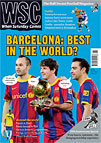 Thanks to share rules, German fans retain a say in the running of their clubs. But Paul Joyce worries this may be about to change
Thanks to share rules, German fans retain a say in the running of their clubs. But Paul Joyce worries this may be about to change
German football is justifiably proud of its strict regulations on club ownership. In order to prevent predatory investors seizing control of teams, the statutes of the German Football League (DFL) decree that at least 50 per cent of a professional club’s shares plus one controlling vote must be owned by its members, ie the supporters. This democratic model also means that fans of teams such as Schalke 04 and 1.FC Cologne have recently been able to use their clubs’ AGMs to block unpopular measures proposed by their boards.
